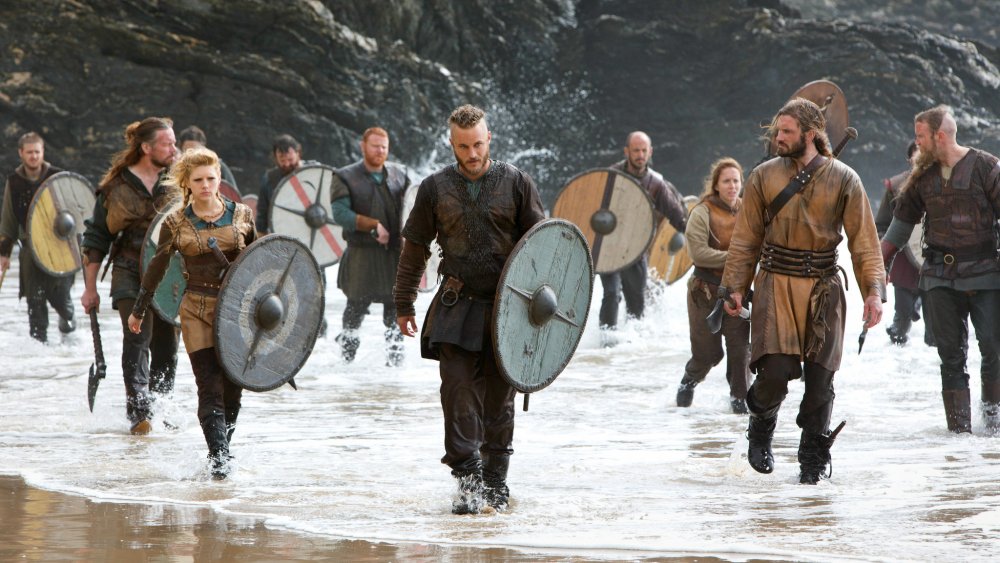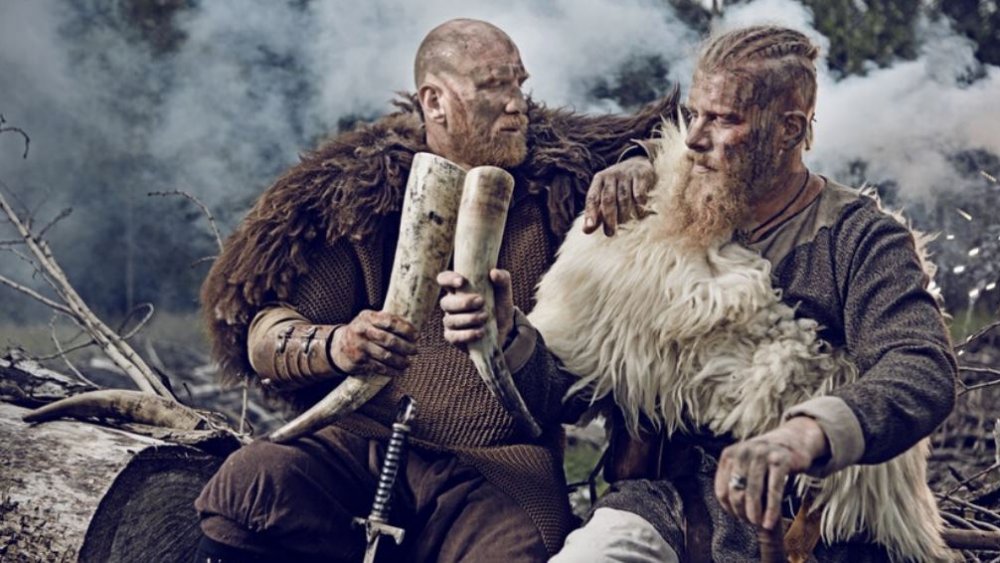The True Meaning Behind The Phrase 'Skol' In Vikings
In a television landscape dominated by shows such as HBO's Game of Thrones and Rome, the History Channel's Vikings has forged its own path since 2013, leaving an indelible mark on the small screen that's hard to forget. The historical program has brought viewers an entire six seasons of characters growing, changing, and — in some cases — dying, which have kept millions of eyes glued to the screen, through the good and the bad.
Even as the storylines of Vikings go through various twists and turns, though, some things never change, particularly when it comes to replicating the historical setting the show is based on. Indeed, there's one thing used just as it was back when Vikings were around in the real world: language. With dialect coach Poll Moussoulides on set, according to TV Insider, the Vikings actors are able to speak Old Norse and Old Low Franconian as easily as English.
And if there's one phrase used the most, it has to be "skol." Here's what it means.
Skol is the friendliest word on Vikings
As both a piece of history, and a word in a foreign language, no two historians or dictionaries agree on the exact meaning of skol. All that's agreed upon for sure is that the phrase is of Scandinavian origin, reflected in its original spelling: skål, with the "å" considered an entirely unique letter from "a."
On Vikings, skol is often heard during scenes rife with food and drink, when companionship is at its peak and everyone is in high spirits. It acts as a sort of toast, similar to how today people might say "cheers" before clinking glasses. In that way, it's one of the show's highlights — a sign of friendship and good cheer, in a story full of violence, betrayal, and tragedy. In real life, different dictionaries will tell you skol means "good health" (Collins English Dictionary), "to drink something, especially beer, all at once without pause" (Cambridge Dictionary), or so on, to various degrees. Whichever way you slice it, skol is best used to express the utmost appreciation for good company.
A Daily Norseman article, though, speaks to the contrary, providing an entirely different definition: "Viking warriors would decapitate the king or leader of the tribe/army they had just vanquished and that night would drink from his skull — spelled skoll — as a sign of respect for the fallen opponent." This particular interpretation may be historically inaccurate, however, and primarily based on popular false portrayals of Vikings as barbarians. Vikings have often been stereotyped in the same way pirates often are, with stories focusing in on, or amplifying, the most bombastic aspects.
That's why shows like Vikings (which itself can be inaccurate, to be fair) are worth watching: they depict historical cultures as more than one-sided affairs. Skol indeed.
Skol and other Old Norse words used today
Despite being an Old Norse word, skol is still heard today — and fairly often, at that. The Minnesota Vikings football team has adopted the phrase wholeheartedly, even using the word in its official theme song. Fans of the team sound a "skol" chant to get themselves pumped up, topped off by a gargantuan Gjallarhorn that rings throughout U.S. Bank Stadium to send the players into "battle." But skol isn't the only word that's been adopted for contemporary purposes. In fact, the Vikings' Old Norse language influenced modern English quite a bit, according to History: words as common as "anger" and "kid" have their roots in Scandinavian soil. The most famous example is probably "Thursday," derived from the Viking phrase for "Thor's day."
Vikings will come to an end with the second half of its sixth season, set to air in late 2020. What other Norse words and phrases might audiences be introduced to before the show concludes? Time will tell.


